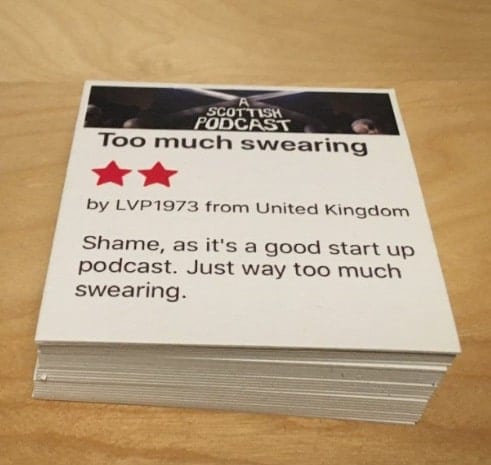Should I Respond to Podcast Criticism? (And if So, How?)
Anytime you make something new, whether it’s a crayon drawing or a podcast, someone will say something negative. Criticism is inevitable. Buckling under it, however, is not. There are different kinds of podcast criticism; some are helpful (even if they don’t feel good initially). The only important part is how you respond. Here are some strategies to consider the source and consequences of the podcast criticism, whether you should respond, and, if so, how.
Consider the Source of the Podcast Criticism
Who provided the criticism, and how? Is this criticism consequential (in the literal sense) or not? For example, if Joe Rogan said, on his podcast with hundreds of thousands of followers, “[title of show] is the most monotonous podcast I’ve ever heard,” there would be consequences for your show. If Sharky Greene posted on his Facebook page to his ten followers, “[title of show] is dumb,” it’s unlikely to affect your podcast’s reputation. The post might sting a bit, but it reflects Sharky and his tastes more than anything else.
Who’s Sharky Greene?
Exactly.
Is this podcast criticism posted publicly, or sent to you privately? Where and how? For example, is it a review in a podcast directory, on someone else’s social media, or in a direct email? Did the person (how old-school is this) say it to your face?
Can other people, especially strangers, see it, in a place where it could affect whether or not they choose to hit play on your podcast?
Consider the Critique
Use the THINK rule of internet discourse. Take a close look at the criticism and ask if it is true, helpful, inspiring, necessary, or kind. Someone might explain that the audio needs volume leveling or that an episode cut off abruptly: that’s okay. This is the kind of podcast criticism we all need to improve. Unfortunately, people rarely know how to write a constructive review.

Is the podcast criticism specific to your show and how it’s made? Not all podcast directories require audiences to listen to one or more episodes before writing a review. Sometimes, people post bad reviews because they disagree with the creators’ political or social opinions. They may say negative things about your show on social media because they’re bullies. But, if the criticism is clear and specific enough to show they paid attention to the episode, it may be worth considering.
Is it a personal attack? As I said, some people post rude or harmful things to make themselves feel more powerful. This may violate the Terms of Service wherever it’s posted (such as a directory). These personal attacks say much more about the poster than the podcast they’re discussing.
Is the podcast criticism visible to others, and is it likely to harm your show? For example, is this a review in a podcast directory or app, on a review site or blog, or a private message?
Is it posted somewhere that you can respond? Apple Podcasts, for example, lets users post once for each podcast, with no responses. Podchaser, on the other hand, is set up so people can review an entire podcast or any episode, and the podcast’s owner can respond publicly.
How to Respond (and Whether You Should)
Podcast criticism may hurt, but acting on hurt feelings is never good. Sort out your feelings privately. Write them down if necessary: this can help you separate your thoughts from your emotions. Don’t spend too much time thinking about how that podcast criticism makes you feel. Time spent picking at that emotional wound is time spent away from producing and improving your podcast.
Should You Respond?
Most of the time, responding to podcast criticism is unnecessary. However, if negative feedback is posted somewhere that could affect your show’s growth, ignoring it might not be an option.
Podcast Directory Reviews Aren’t Facebook Comments
In Apple Podcasts, reviews are static. You can’t remove or reply to them. But, you can report the review if they violate Apple’s Terms of Service. Unfortunately, the only way to deal with negative reviews on Apple Podcasts is to get positive reviews to balance it out. Ask a friend or genuine fan who hasn’t reviewed it yet to do so. Most podcast directories follow the same pattern.
Again, Podchaser allows a podcast’s creator to respond. For positive reviews, yes, definitely, you should, and thank them.
Spotify now has a comments feature. As Maya Prohovnik, VP of Podcast Product at Spotify, said, “Listeners can actually have a two-way conversation with their favorite podcast hosts on Spotify, podcasters can get near-immediate feedback from their audiences, and real communities can form around shows.” Spotify also lets podcasters approve and review comments before they are publicly displayed, which means nothing cruel or hateful can appear there without you knowing.
Most directories or apps don’t let the podcaster moderate reviews, though. So, if you can respond to a negative comment, should you?
Why Should You Respond to Podcast Criticism?
Some negative feedback is worth your time and energy. If the podcast criticism is legitimate, i.e., “the audio pans so rapidly and often that it makes me dizzy,” that’s not unreasonable.
Keep your response short and constructive. Something like, “Thanks for listening. We’re working to improve our audio skills and may remaster some episodes. Thanks again for sharing your opinion” is fine.
When You Shouldn’t Respond to Podcast Criticism
Responding negatively to a negative review is never a good look.
Sometimes, podcast criticism is specific, and the person thinks they’re helpful but misses the point. For example, “I can’t believe the Big Bad Wolf impersonated Little Red’s grandmother! A real wolf would never wear an old lady’s nightgown!” shows that someone doesn’t get it. These people misunderstand the point of your show. Pat yourself on the back: your show’s notoriety has extended beyond the niche you tried to reach. Nice work!

Where You Should, or Shouldn’t, Respond
Other people can see podcast criticism on social media. Handle this on a case-by-case basis. It can be productive for the original poster to know there’s a real person on the other end of their criticism. Thank them for trying your show, and use a “kill them with kindness” approach. Respond once, don’t let it escalate, and call it a day. Remember, you’re on their social media feed. They don’t have to be nice about how they respond. Their followers can see how you react, and that reflects on your podcast.
Negative criticism via email or a private message should be the easiest to ignore because it’s not posted publicly. However, since it’s less public, the criticism may use more hurtful language. If the criticism is irrational and/or hurtful, don’t respond. Bin it and block them.
Again, thank them for listening if the podcast criticism is genuine and constructive. Remind them that podcasting is a relatively new technology; we’re all learning how to improve the medium.
I’ve been producing a podcast with my brother to teach him how to edit audio. Once, a friend emailed me to let me know that my brother edited and uploaded the latest episode with 30 minutes of dead air at the end. That’s the kind of podcast criticism I welcome.
Don’t Feed the Trolls.

They’re not your audience. Let them get bored and go away. If the podcast criticism violates a directory or social media platform’s terms of service, report it to the platform if you can, and block the user. If it’s 100% hate mail and contains threats, take screenshots and contact local law enforcement.
Be the Bean
There’s an uplifting parable about a woman teaching her daughter about life’s difficulties. She boiled three pots of water, placing carrots in one, eggs in another, and coffee beans in the third. After boiling, the carrots were soft, the eggs were hard, and the coffee transformed the water into a rich aromatic brew.
Her mother explained, “Each faced the same adversity—boiling water—but reacted differently. The carrots went in hard and became soft; the eggs went in fragile but turned hard inside. The coffee beans, on the other hand, not only withstood the heat, but transformed the water into something new.”
When faced with adversity, be like the coffee bean and always try to transform your situation for the better.
Not Everything Appeals to Everyone, and That’s a Good Thing.
We should live in a world where people can provide constructive feedback and others can learn from it. Unfortunately, the anonymous nature of the Internet can promote some inhuman behavior. When you get podcast criticism that hurts, remember, it’s not you that they’re dragging; it’s the show. Your show won’t appeal to everyone, and that’s all right. Don’t waste too much time on it. The people who do care about your show will stick around.
What are your strategies for coping with podcast criticism? Join us in the Indiepod Community, and let’s chat about it. I’m eager to know what you think.

